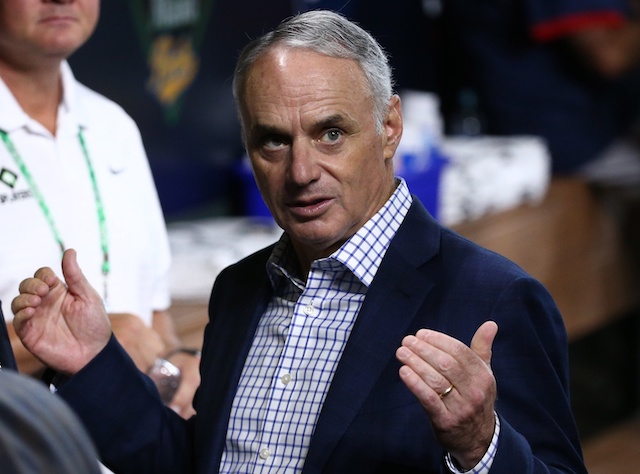As Major League Baseball and the Players Association negotiate — or more so refuse to negotiate — a new Collective Bargaining Agreement, the core issues have been separated into two categories. The first is core economic issues and the second is rule changes.
What has held up CBA talks for such a long time has been the core economic debate. Things like luxury tax, salary floors and caps, minimum salaries, and free agency have been hot-button issues that neither side has shown a willingness to give in on.
Owners have given no indication that they want to make significant changes to the league’s current financial system, while the players have made it clear that they feel take advantage of under the current system. This is a horrible place for negotiations to start, and it’s affecting the other issues of the debate as well.
For now, the league has reportedly attempted to separate core economic talks from on-field rule changes, according to Ken Rosenthal of The Athletic:
Manfred also faces pressure on another front, one that barely is mentioned amid the squabbling over core economic issues, but might be just as meaningful to the long-term health of the sport. The game has deteriorated aesthetically, from the lagging pace of play to the rise of the three true outcomes (home runs, strikeout, walks) at the expense of action.
Rules changes, however, are not part of these negotiations; the league wants to deal with them separately. It is doubtful Manfred will ever reach agreement with the players on meaningful adjustments, not when the union is composed almost equally of hitters and pitchers with very different agendas. To this point, he has refrained from exercising his right to unilaterally implement changes with a year’s notice, fearing it would damage his relationship with the union. Well, he damaged that relationship in other ways, and the sport remains at least a year away from meaningful change.
On the surface, it’s not a bad idea to separate these two vastly different issues. They appear to have no bearing on one another and could easily solve one while still working the other. But, as Rosenthal stated, the Players Association is too balanced between pitchers and hitters for meaningful change to occur.
One discussion that has taken place is regarding defensive shifts and whether or not they should be regulated. Hitters are likely in full favor of regulating shifts, as it would almost certainly increase batting averages and on-base percentages.
But for the same reason, pitchers would be against it, saying that their stats shouldn’t be punished by forcing defenders to protect the field in a certain way. So even a topic as simple as that could come to a stalemate.
Commissioner Rob Manfred is wise not to use his power to unilaterally impose a rule change with one year’s warning. Perhaps the only rule that wouldn’t receive backlash is a universal DH, something all hitters and pitchers should be in favor of.
All of this suggests that we are no closer to a resolution than we were about one week ago, when the two sides met to discuss an official proposal from the owners.
Teams could receive draft picks for calling top prospects up early
Players have long been determined to find a solution for service-time manipulation. This is when teams delay the calling up of a prospect until a certain day so that they gain another year of team control on the back-end of their arbitration eligibility.
One way the league proposed to solve this was awarding draft compensation for teams who called up top prospects at the beginning of seasons, rather than waiting. We’ll see if this change makes its way onto the CBA.



